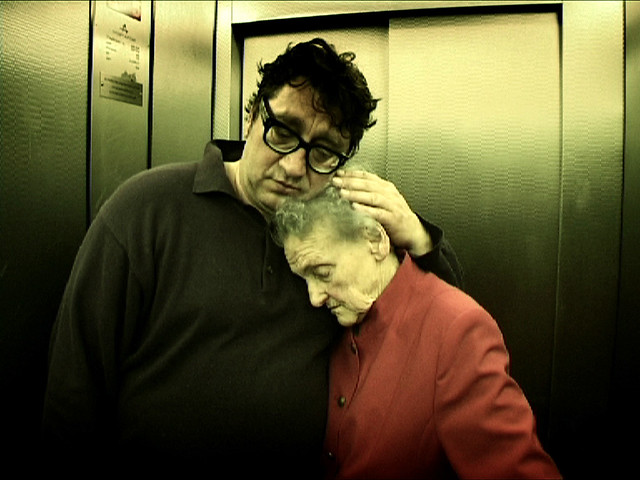 Back to selection
Back to selection
A YEAR WITHOUT RENT IN PARK CITY: “OK, GOOD” AND “HEAVY GIRLS”
One of the trickier things about reviewing movies at a festival is that your identity isn’t exactly a secret. You’ve got a press pass with your name and the name of your outlet on it, so a lot of conversations you have with filmmakers revolve around that very fact. Or you end up in a long conversation at the Kickstarter party with the director of a film you hated. But my philosophy is if you can’t stand face-to-face with someone and defend your opinion of their work, then you have no business telling it to anyone else. Comments and critiques from behind the veil of anonymity are cowardly and childish and harmful. There’s no place for them in the indie film community.
Which brings us to Daniel Martinico’s Ok, Good, essentially a one-man show of struggling actor Hugo Armstrong and his endless string of rejections. We watch Armstrong go through commercial audition after commercial audition, all of them for things like laundry detergent and potting soil and any number of things you don’t necessarily care about.
But Armstrong cares. He cares deeply, spending hours poring over scripts and rehearsing even the simplest things like how he introduces himself to the casting director. He’s meticulous. Maybe too meticulous. He finds a flaw in the duplication of his headshot, and the rectification of that pretty much becomes his life mission for awhile.
It wears on him and we start to see his processes fall apart, little by little. All the while, he’s attending these acting workshops where a bunch of actors pace around a room, screaming at each other and doing some bizarre form of yoga and, well, all sorts of weird shit. It’s all very primal and you half expect them to be getting psyched up for a football game. But I guess that’s what they do.
What’s probably most impressive about Ok, Good is the cinematography. Martinico shot it himself and it looks fantastic, with an attention to detail that dovetails beautifully with Armstrong’s preparations. The audition footage looks appropriately terrible, but everything is well-frame, each shot serving a purpose. It’s all the more impressive when you consider that the crew was probably no one.
It all leads to an ending that’s kind of terrifying in it’s brutality and finality. I’m still not sure how I feel about it, but for sure it gets under your skin in a way very few films do. The entire third act is so raw, so brutal, that it forces you to confront it. Or, you can walk out. And a lot of people walked out. It’s a shame, because love it or hate it, isn’t that why you come to a festival, to see stuff that pushes your buttons?
I mean, I get walking out if the film is inept, but when the film is obviously well-made, I don’t see the point. Although, the older man sitting in front of me showed up late, spent 20 minutes surfing Match.com on his phone, and accidentally took my jacket. I was glad when he walked out.
The next day, I talked to Daniel and Hugo about their film when I ran into them at a party. I hadn’t written this yet, and I wasn’t sure how I felt about the film. I’m still not. We talked about that for a good ten minutes. It’s a difficult film, hard to watch and even harder to enjoy. It would be easy to hate, but impossible to not respect on some level.
I kind of feel the same way about Dicke Mädchen (Heavy Girls), Axel Ranisch’s film about 2 somewhat large, middle-aged men sort of kind of falling in love.
The film stars Heiko Pinkowski as Sven, a sad man who works at a bank and lives with his mother and her dementia. She has a helper (Peter Trabner) who watches her during the day. And Sven is in love with him in the cutest, puppy dog way you could imagine.
The film is incredibly sweet, anchored by a incredible performance by Pinkowski that slowly builds over the course of the narrative. It sneaks up you, really.
Thing is, the film looks terrible. So much so, it’s difficult to watch. According to the press notes, they shot the film on miniDV on a consumer-level camera, “in order to attain the greatest amount of creative freedom and authenticity”. There’s a lot to be said for that, but the film still looks terrible, and detrimentally so. The whole film is shot with auto exposure and (I think) auto focus, so there’s large parts of the film where you can’t see an actor’s face in places where you really, really want to see the actor’s face. And it never feels like a choice. It feels like no one knows how to work the camera. There’s authenticity and then there’s basic competency. You can accomplish the former by using the latter and lose nothing in the process. That’s what’s so frustrating about the film. It’s such a good story and so well acted and with an extra 20 minutes of pre-production, it would be a really impressive film.
Filmmaker Lucas McNelly is spending a year on the road, volunteering on indie film projects around the country, documenting the process and the exploring the idea of a mobile creative professional. You can see more from A Year Without Rent at the webpage. His feature-length debut is now available to rent on VOD. Follow him on Twitter: @lmcnelly.


